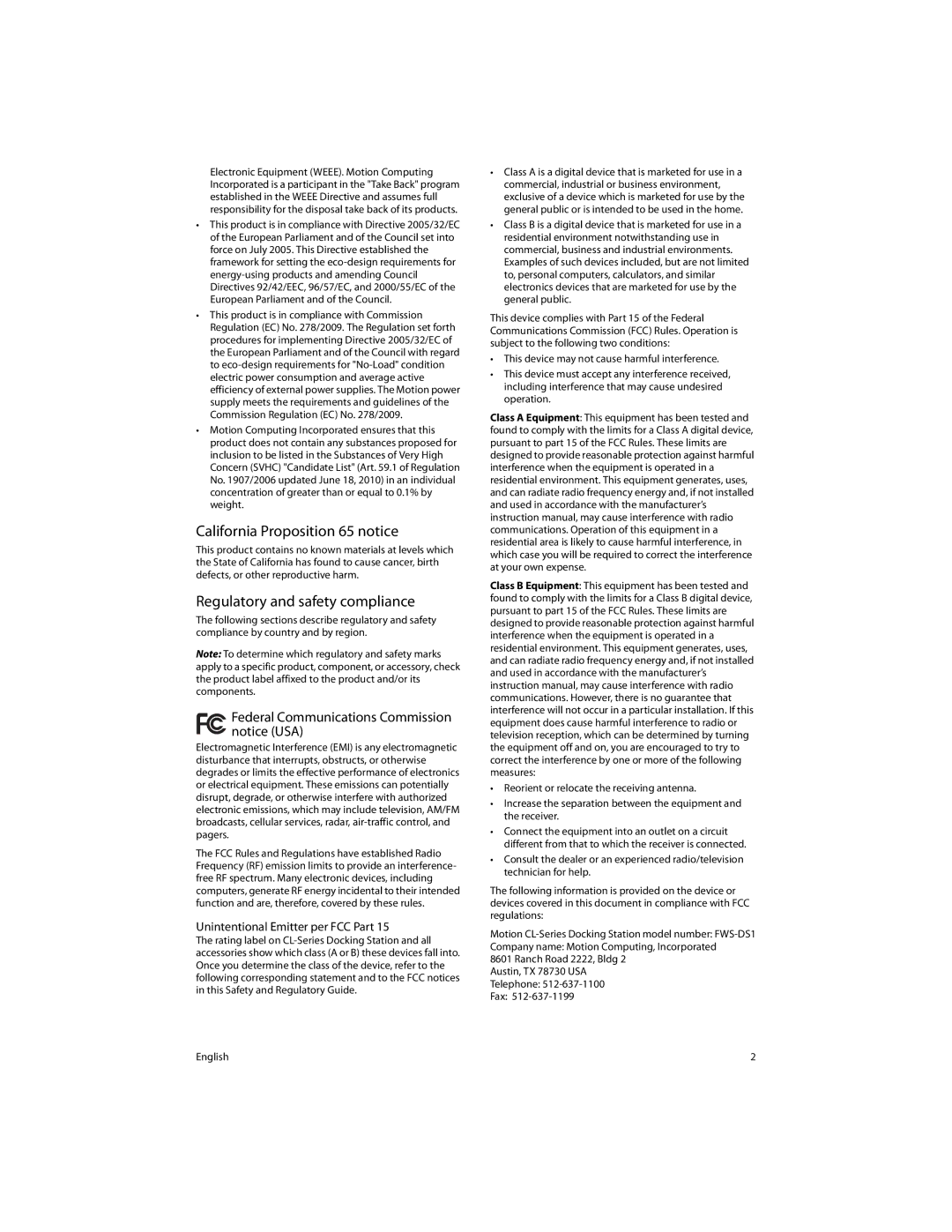Electronic Equipment (WEEE). Motion Computing Incorporated is a participant in the "Take Back" program established in the WEEE Directive and assumes full responsibility for the disposal take back of its products.
•This product is in compliance with Directive 2005/32/EC of the European Parliament and of the Council set into force on July 2005. This Directive established the framework for setting the
•This product is in compliance with Commission Regulation (EC) No. 278/2009. The Regulation set forth procedures for implementing Directive 2005/32/EC of the European Parliament and of the Council with regard to
•Motion Computing Incorporated ensures that this product does not contain any substances proposed for inclusion to be listed in the Substances of Very High Concern (SVHC) "Candidate List" (Art. 59.1 of Regulation No. 1907/2006 updated June 18, 2010) in an individual concentration of greater than or equal to 0.1% by weight.
California Proposition 65 notice
This product contains no known materials at levels which the State of California has found to cause cancer, birth defects, or other reproductive harm.
Regulatory and safety compliance
The following sections describe regulatory and safety compliance by country and by region.
Note: To determine which regulatory and safety marks apply to a specific product, component, or accessory, check the product label affixed to the product and/or its components.
Federal Communications Commission notice (USA)
Electromagnetic Interference (EMI) is any electromagnetic disturbance that interrupts, obstructs, or otherwise degrades or limits the effective performance of electronics or electrical equipment. These emissions can potentially disrupt, degrade, or otherwise interfere with authorized electronic emissions, which may include television, AM/FM broadcasts, cellular services, radar,
The FCC Rules and Regulations have established Radio Frequency (RF) emission limits to provide an interference- free RF spectrum. Many electronic devices, including computers, generate RF energy incidental to their intended function and are, therefore, covered by these rules.
Unintentional Emitter per FCC Part 15
The rating label on
•Class A is a digital device that is marketed for use in a commercial, industrial or business environment, exclusive of a device which is marketed for use by the general public or is intended to be used in the home.
•Class B is a digital device that is marketed for use in a residential environment notwithstanding use in commercial, business and industrial environments. Examples of such devices included, but are not limited to, personal computers, calculators, and similar electronics devices that are marketed for use by the general public.
This device complies with Part 15 of the Federal Communications Commission (FCC) Rules. Operation is subject to the following two conditions:
•This device may not cause harmful interference.
•This device must accept any interference received, including interference that may cause undesired operation.
Class A Equipment: This equipment has been tested and found to comply with the limits for a Class A digital device, pursuant to part 15 of the FCC Rules. These limits are designed to provide reasonable protection against harmful interference when the equipment is operated in a residential environment. This equipment generates, uses, and can radiate radio frequency energy and, if not installed and used in accordance with the manufacturer’s instruction manual, may cause interference with radio communications. Operation of this equipment in a residential area is likely to cause harmful interference, in which case you will be required to correct the interference at your own expense.
Class B Equipment: This equipment has been tested and found to comply with the limits for a Class B digital device, pursuant to part 15 of the FCC Rules. These limits are designed to provide reasonable protection against harmful interference when the equipment is operated in a residential environment. This equipment generates, uses, and can radiate radio frequency energy and, if not installed and used in accordance with the manufacturer’s instruction manual, may cause interference with radio communications. However, there is no guarantee that interference will not occur in a particular installation. If this equipment does cause harmful interference to radio or television reception, which can be determined by turning the equipment off and on, you are encouraged to try to correct the interference by one or more of the following measures:
•Reorient or relocate the receiving antenna.
•Increase the separation between the equipment and the receiver.
•Connect the equipment into an outlet on a circuit different from that to which the receiver is connected.
•Consult the dealer or an experienced radio/television technician for help.
The following information is provided on the device or devices covered in this document in compliance with FCC regulations:
Motion
Company name: Motion Computing, Incorporated 8601 Ranch Road 2222, Bldg 2
Austin, TX 78730 USA Telephone:
English | 2 |
